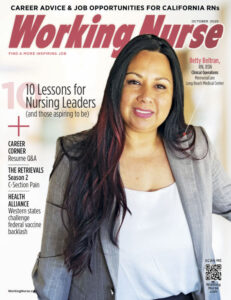Feature
Finding Your Feet in the Deep End
Hone your abilities and one day YOU will be the experienced nurse

Whether you’re a new grad or mid-careerist, working alongside established, experienced nurses can be Intimidating. They seem to glide in and out of rooms without a care; their head-to-toe assessments are perfectly documented; and when they draw up IV medications, they already know what drugs require a normal saline dilution and over exactly how many minutes to administer it.
Just watching them in action, you can’t help but question yourself and fear that you may be out of your depth. After 16 years in this profession, I’m no longer a newbie, but getting my feet under me and my head above water was a years-long process.
Steps for Success
Instead of measuring ourselves against the performance and competency of seasoned nurses, it’s best to up our own game. Here’s how:
Leave the house early
This will allow for the possibility of hectic traffic and a crowded parking lot. Ensuring you arrive on time for the start of your shift will decrease anxiety, instill confidence and be a pleasant sight to your coworkers and management.



























